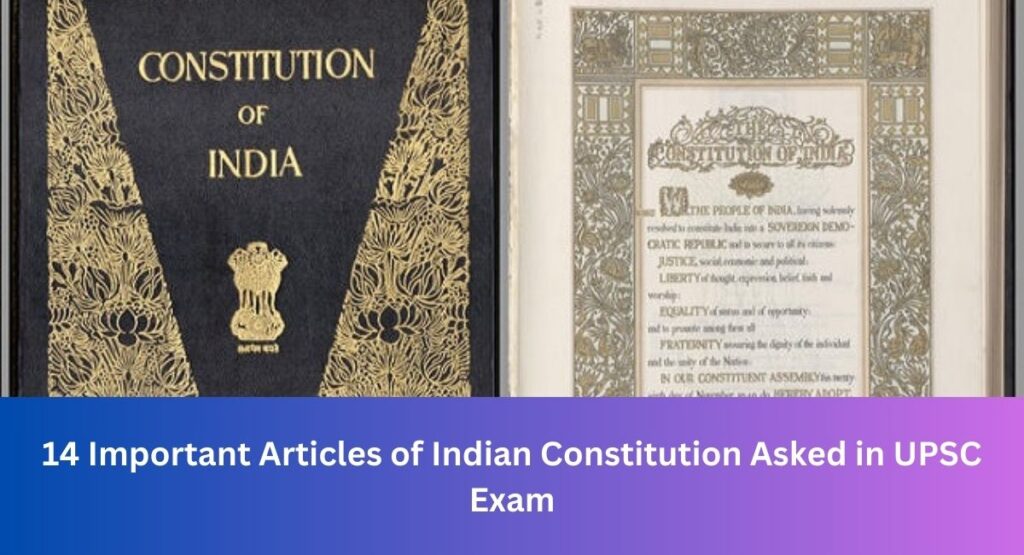The Indian Constitution, drafted by Dr. B.R. Ambedkar and his committee, is the supreme law of India. It establishes the framework for the democratic government of the world’s largest democracy. This document, with its 444 articles and 12 schedules, enshrines the rights and duties of Indian citizens. Understanding some of the most crucial articles is essential for anyone seeking a deeper understanding of Indian society and governance.

We have Analyse Previous Years Papers and Found out Repetitive Questions based on these Important Articles of Indian Constitution.
Key Takeaways:
- The Constitution of India outlines the fundamental rights, directive principles, and fundamental duties of Indian citizens.
- It establishes the framework for the parliamentary form of government with a federal structure.
- The document ensures the separation of powers between the legislature, executive, and judiciary.
Examining 20 Important Articles of Indian Constitution (Exam Perspective):
1. Article 14 (Equality Before Law)
- Guarantees equal protection of law for all citizens.
- Prohibits discrimination based on religion, race, caste, sex, or place of birth.
- Crucial for ensuring a just and equitable society.
2. Article 15 (Prohibition of Discrimination on grounds of Religion, Race, Caste, Sex or Place of Birth)
- Expands on Article 14 by prohibiting discrimination in specific areas.
- This includes access to shops, public places, and educational institutions.
- Underlines the commitment to an inclusive society.
3. Article 19 (Protection of Certain Rights Regarding Freedom of Speech, etc.)
- Grants citizens fundamental freedoms such as freedom of speech, assembly, movement, and association.
- These freedoms are subject to reasonable restrictions for public order, morality, and national security.
- A cornerstone of a vibrant democracy.
4. Article 21 (Protection of Life and Personal Liberty)
- Perhaps the most significant right, guaranteeing protection of life and personal liberty.
- This right can only be curtailed according to the procedure established by law.
- Protects citizens from arbitrary arrest and detainment.
5. Article 22 (Protection against Arrest and Detention)
- Lays down specific procedures for arrest and detention.
- Ensures a person is informed of the reason for arrest and has the right to consult a lawyer.
- Safeguards against unlawful imprisonment.
6. Article 24 (Prohibition of Child Labor)
- Prohibits the employment of children below the age of 14 in factories, mines, and other hazardous occupations.
- Aimed at protecting children from exploitation and promoting their education.
- Article reflects India’s commitment to child welfare.
7. Article 25 (Freedom of Religion)
- Guarantees freedom of conscience and the right to practice, profess, and propagate religion.
- This freedom is subject to public order, morality, and health.
- Promotes religious tolerance and pluralism.
8. Article 26 (Freedom to manage religious affairs)
- Empowers religious denominations to establish and maintain institutions, manage their affairs, and acquire and dispose of property.
- Protects the autonomy of religious institutions.
9. Article 29 (Cultural and Educational Rights)
- Protects the right of minorities to conserve their language, script, and culture.
- Also ensures the right to establish and administer educational institutions.
- Preserves the cultural heritage of India’s diverse communities.
10. Article 32 (Right to Constitutional Remedies)
- Empowers citizens to move the Supreme Court for enforcement of Fundamental Rights.
- This is a crucial safeguard against violation of fundamental rights.
- Strengthens the concept of judicial review.
11. Article 35 (Right to Education)
- A directive principle, stating the state’s responsibility to provide free and compulsory education for all children until the age of 14.
- Highlights the government’s commitment to universal education.
12. Article 38 (State to secure a just order)
- Another directive principle, directing the State to strive to promote a social order in which justice prevails.
- This includes economic and social justice.
- Sets the goal of an equitable and prosperous society.
13. Article 41 (Right to work, to education and to public assistance in certain cases)
- A directive principle, directing the State to provide opportunities for work, education, and public assistance in case of unemployment, old age, sickness, and disability.
- Underlines the state’s responsibility for social welfare.
14. Article 44 (Uniform Civil Code)
- A non-justiciable directive principle, envisioning a single set of laws applicable to all citizens regardless of religion.
- Aims to promote secularism and national integration.
15. Article 51A (Fundamental Duties)
- Outlines fundamental duties of citizens, such as respect for the Constitution, national symbols, and the promotion of harmony.
- These duties complement fundamental rights and foster responsible citizenship.
16. Article 73 (Panchayats)
- Added by the 73rd Amendment, this emphasizes the importance of local self-governance through Panchayats.
- Empowers village-level institutions for decision-making and development.
17. Article 74 (Municipalities)
- Added by the 74th Amendment, this establishes a framework for urban self-governance.
- Provides for the formation of municipalities in urban areas.
18. Article 124 (Establishment and Constitution of the Supreme Court)
- Establishes the Supreme Court as the highest court of the land.
- Grants it powers of judicial review and appellate jurisdiction.
19. Article 153 (Governors of States)
- Outlines the position of Governors as heads of states.
- Specifies their appointment, powers, and functions.
20. Article 356 (President’s Rule)
- Empowers the President to impose President’s Rule in a state upon failure of the state’s constitutional machinery.
- This provision ensures order and restores state function.
Conclusion
The Indian Constitution weaves a tapestry of rights, principles, and duties to provide a strong foundation for the nation. Understanding these important articles of Indian Constitution is not just useful for exams but vital for every citizen who wants to participate actively in the democratic process and uphold the values enshrined in our Constitution.
Frequently Asked Questions (FAQs)
What is the difference between Fundamental Rights and Directive Principles of State Policy?
Fundamental Rights are guaranteed by the Constitution and are enforceable in court. Directive Principles are guidelines for the state to follow, but not legally enforceable.
Why are Fundamental Rights so important?
Fundamental Rights protect individual freedom and ensure essential liberties against arbitrary action by the state. They form the bedrock of a democratic society.
Can Fundamental Rights be suspended or restricted?
In limited cases, some fundamental rights may be restricted while others may be suspended during a national emergency under defined procedures.
